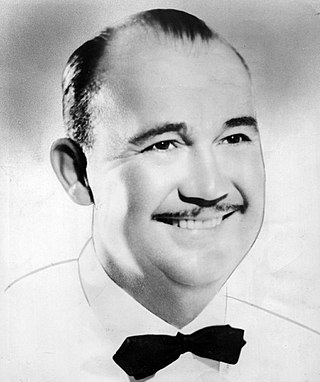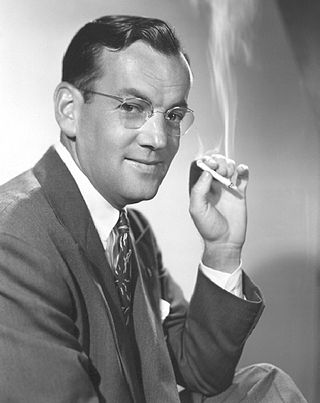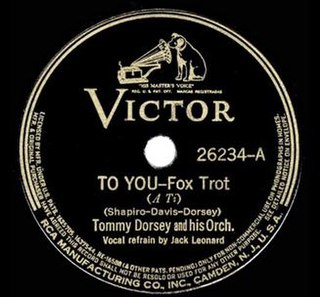
Paul Samuel Whiteman was an American bandleader, composer, orchestral director, and violinist.

"Chattanooga Choo Choo" is a 1941 song written by Mack Gordon and composed by Harry Warren. It was originally recorded as a big band/swing tune by Glenn Miller and His Orchestra and featured in the 1941 movie Sun Valley Serenade. It was the first song to receive a gold record, presented by RCA Victor in 1942, for sales of 1.2 million copies.

Glenn Miller and His Orchestra was an American swing dance band formed by Glenn Miller in 1938. Arranged around a clarinet and tenor saxophone playing melody, and three other saxophones playing harmony, the band became the most popular and commercially successful dance orchestra of the swing era and one of the greatest singles charting acts of the 20th century. As of 2023, Ray Anthony is the last surviving member of the orchestra.

Nathaniel Shilkret was an American musician, composer, conductor and musical director.
Theodora Morse was an American songwriter and composer. She was a Tin Pan Alley lyricist who collaborated to produce a number of popular songs.

"Smoke Gets in Your Eyes" is a show tune written by American composer Jerome Kern and lyricist Otto Harbach for the 1933 musical Roberta. The song was sung in the Broadway show by Tamara Drasin. Its first recorded performance was by Gertrude Niesen, who recorded the song with orchestral direction from Ray Sinatra, Frank Sinatra's second cousin, on October 13, 1933. Niesen's recording of the song was released by Victor, with the B-side, "Jealousy", featuring Isham Jones and his Orchestra.
Nadine Dana Suesse was an American musician, composer and lyricist.

"Deep River" is an anonymous African-American spiritual, popularized by Henry Burleigh in his 1916 collection Jubilee Songs of the USA.

"Hot Lips" or "He's Got Hot Lips When He Plays Jazz" is a popular song written by jazz trumpeter Henry Busse, Henry Lange, and Lou Davis. The song was a number one hit for Paul Whiteman and His Orchestra. Henry Busse was a founding member of the Paul Whiteman Orchestra, joining in 1920.

"Whispering" is a popular song, first published in 1920 by Sherman, Clay & Co., of San Francisco. The initial 1920 copyright and first publishing attributes the lyrics to Malvin Schonberger and the music to John Schonberger.

Between 1938 and 1944, Glenn Miller and His Orchestra released 266 singles on the monaural ten-inch shellac 78 rpm format. Their studio output comprised a variety of musical styles inside of the Swing genre, including ballads, band chants, dance instrumentals, novelty tracks, songs adapted from motion pictures, and, as the Second World War approached, patriotic music.
"Indian Summer" is an American standard originally written as a piano piece by the prolific composer Victor Herbert. Al Dubin wrote lyrics for the tune in 1939, twenty years after Herbert wrote the tune.

"Runnin' Wild" is a popular song first composed and recorded in 1922, written by Arthur Harrington Gibbs with lyrics by Joe Grey and Leo Wood.

Boom Shot is a 1942 song composed by Glenn Miller and Billy May for the 20th Century Fox movie Orchestra Wives starring George Montgomery and Ann Rutherford.

"To You" is a 1939 song composed by Tommy Dorsey with Benny Davis and Ted Shapiro. The song was a top 10 hit on the Billboard charts.

"Sensation Rag" or "Sensation" is a 1918 jazz instrumental by the Original Dixieland Jazz Band. It is one of the earliest jazz recordings. It is not related to Joseph Lamb's 1908 "Sensation Rag", which is a ragtime piano piece.

"Wang Wang Blues" is a 1920 jazz composition written by Henry Busse, Gussie Mueller, and Theron E. "Buster" Johnson, with lyrics by Leo Wood. The song was released as a 78 single by Paul Whiteman and his Orchestra featuring Henry Busse on trumpet. The song is a pop and jazz standard.

"7-0-5" or "Seven-O-Five" or "705" is an instrumental composed by Glenn Miller in 1943. The instrumental was performed by the Army Air Force Orchestra under the leadership of Capt. Glenn Miller in 1943-1944 and in 1945 under Sgt. Jerry Gray.

The Glenn Miller Carnegie Hall Concert is a live album by Glenn Miller and his Orchestra. It documents a live concert recorded in Carnegie Hall in 1939. The album was released by RCA Victor in 1958.

















